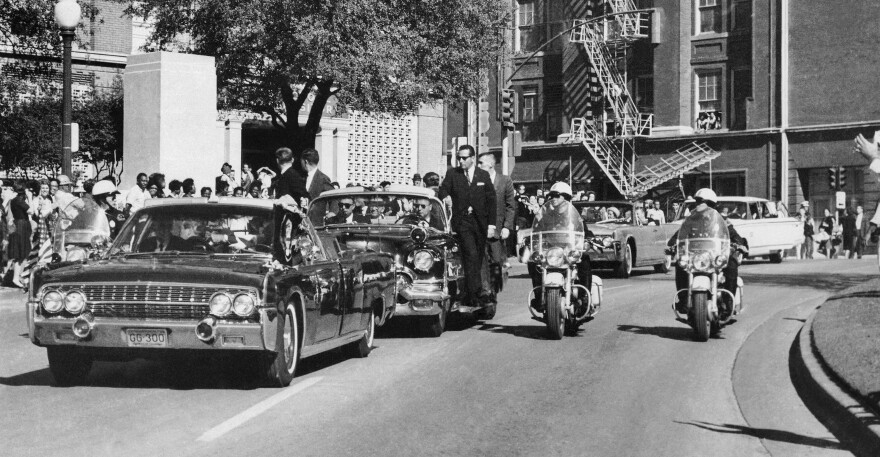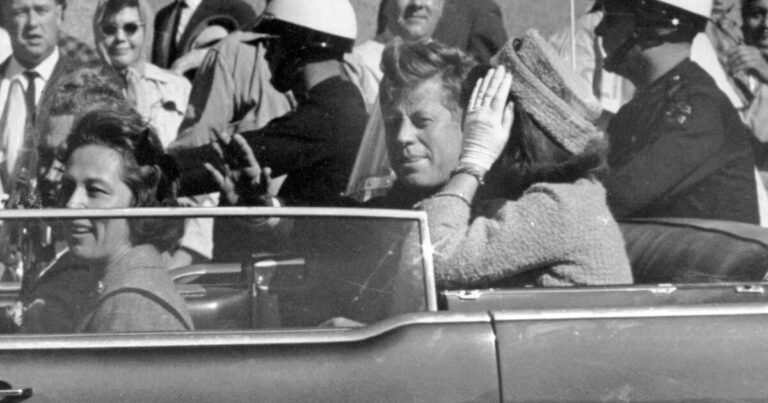November 22, 2023 marks the 60th anniversary of the day President John F. Kennedy was shot and killed as his motorcade passed through Dealey Plaza in downtown Dallas.
Fifty years after that fateful day, local filmmaker Quinn Matthews released a documentary about the shooting, City of Hate: Dallas and the Assassination. In it, he explores what Dallas was like before JFK's death and how the tragedy affected the city.
Next Wednesday is the 60th anniversary of Kennedy's assassination, and to commemorate the occasion, the J. Eric Johnson Central Library will screen Matthews' film Saturday at 1 p.m.
Matthews spoke with KERA's Bekah Mohr about how Dallas has changed since that day in November 1963.
The following interview has been edited for length and clarity.
You were at Dallas Love Field when the Kennedys arrived in Dallas in 1963. What was the atmosphere like? What was the energy like when they landed in Dallas?
Well, you have to take into account that there was a lot of anxiety in Dallas. I was a child. I was 13 years old. Even though I was still in elementary school, I knew there was a lot of anti-Kennedy sentiment. Dallas Police Chief Jesse Curry appeared on television. I remember watching him and he was telling people to be careful with their manners and that if they did anything illegal when the president came, he would arrest them. .
In such an environment, I went to Love Field with my friend and her father, and the audience was very enthusiastic. It was very crowded. One police officer said to my friend's father, Charlie Ball, “You can't get to him here, but come down by that fence.'' And we went there. There were no crowds at all. We saw the president get off the plane from a distance and you recognized him. That was really exciting.
Then suddenly this large group of people started running, almost running, in our direction, across the cars in the parking lot. I didn't know the president was coming, but the president's car came. And, you know, he was sitting on our side of the car, so he wasn't that far away from me, maybe six or eight feet. He came over and I was a total nerd, waving my arms like crazy, and his friend Chuck Ball looked at me and said something like, “You look like an idiot.” I certainly think so. I just wanted Kennedy to know that he is welcome here.
Was it because he felt he might not be welcome in Dallas because of the political climate at the time?
absolutely. you are right. Anti-Kennedy sentiment was very strong. I wouldn't say it was dominant, but it was loud enough to dominate. He probably thought he would get a rough reception, but it was so exciting to see how warm the audience was and how excited they were to see the Kennedys.
Did you feel bitter in Dallas? Also in the late '50s and early '60s, prior to the Kennedys' visit. Was there a sense that this “City of Hate” designation was already starting to take shape?
yes. You know, we didn't call it that. The title I titled “City of Hate” was one of dozens of letters written to Mayor Earl Campbell expressing the same sentiment. Yes, I was aware of that. The confrontation, yelling and punching of U.N. Ambassador Adlai Stevenson in Dallas was broadcast with Cronkite on the CBS Evening News the next night. And it definitely put Dallas in the spotlight a year ago.

James W. (Ike) Altgens
/
AP
So what has changed?or have Has something changed? Did anything change after the assassination that made people realize that they might have taken things a little too far?
Now, from my perspective, I went from loving my city, my hometown, to hating it that day. I hated Dallas. he wanted to leave. When his father came home from work, I said, “I have to go home.'' I have to leave. We can't live here anymore. 'He's a very reasonable person and he somehow calmed me down. But we beat ourselves in Dallas. absolutely.
We were also defensive. We didn't kill him. I don't know if we influenced the assassin. Probably so. But yeah, it went on for years. So that's when being from Dallas became a stigma.
Was it a true reflection of the city? I think that was a reflection of Dallas not wanting to face things before and after the assassination. We've never really had any conflict, but why do people call Dallas the City of Hate?
The 6th Floor Museum is a great history museum, but there was a lot of opposition to building the museum and even maintaining the building. I think the opposition movement continues. When they brought in architect Philip Johnson, who designed the Kennedy Memorial, they didn't build it near Dealey Plaza. They put it about two blocks away, so it was hidden. Dallas didn't face its past and history.
Are we still seeing these types of events today, creating the idea that Dallas is a city of hate, or are we trying to overcome that negative perception in some way, shape, or form? Is not it? I think it's not just Dallas but all of Texas. I think we Texans have been labeled as very politically charged, so to speak.
Well, that's unfair in a way. I don't think Dallas was a hateful city. I think there was just hatred. I don't think Texas is a hateful state, but hate is there and it's making noise. There is a difference between what we call hate, or an extreme, loud, clearly dominant political ideology that may not have been dominant from 60 years ago to today, that it is not the majority. I think it's related in some ways.
I think this is a city and state with good people. But the Jan. 6 mob is coming from the area, primarily Collin County. Not that I'm particular about Collin County, but he's probably closer to the Dallas of 60 years ago than any other area of Dallas. A mass shooting at a Walmart in El Paso killed 23 people, targeting Hispanics. He was from here. He was from Collin County. There was a guy from Dallas who was chasing Asians at an outlet mall in Allen.
So let's assume for a moment that Oswald was the assassin — I think he was, but we won't go into that in this documentary — but whoever the assassin was, he was Were you influenced by? Did the people around him give him the chance to make a name for himself? Did the shooter who went to Allen Mall see an opportunity because of an undercurrent of hatred? I don't think we can ignore that. Bad things can happen in the right political environment, and I think that environment will continue in many ways, not just in Dallas.
But I'm very proud of Dallas. I'm proud of our diversity and tolerance. I think Dallas has a conscience.
Any tips? Email Rebekah Morr at rmorr@kera.org. You can follow her on Twitter @bekah_morr.
KERA News is made possible through the cooperation of our members. If you find this report valuable, please consider the following: Make a tax-deductible gifttoday. thank you.

